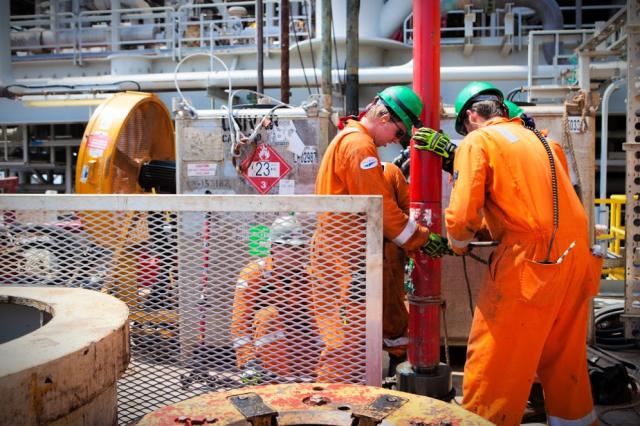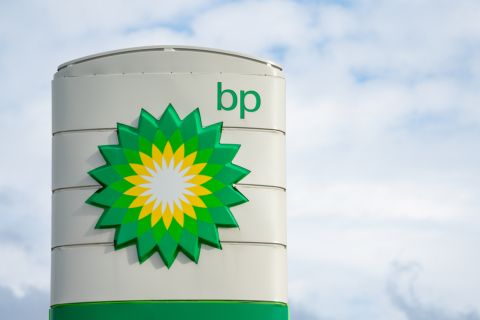
Threaded pipe is used to pick up a heavy part on the deck of BP Thunder Horse in the U.S. Gulf of Mexico. (Source: BP Plc)
[Editor’s note: Opinions expressed by the author are their own.]
BP Plc has been a laggard in the race among oil and gas majors to reposition themselves in the battle against climate change. Now Bernard Looney, its new CEO, is living up to his promises to be bold.
BP, Looney has declared, will become a “net zero carbon” company by 2050 or sooner—that is, its own operations will produce no net CO₂ emissions. The group will also cut by half the amount of carbon in the products it sells by the same date.
For a company that traces its roots to the first oil fields in Iran more than a century ago, this is a radical departure.
The Anglo-Persian Oil Co.—later British Petroleum—was synonymous with the development of the modern oil industry and became one of the Seven Sisters that dominated global energy. Going to net zero will mean eliminating or offsetting about 415 million tonnes of emissions—55 million from BP’s operations and 360 million tonnes from the carbon content of the oil and gas it currently produces.
The company, said Looney, will make the shift by investing more in low-carbon businesses and less in oil and gas over time. Its structure will be revamped. The traditional split into “upstream” exploration and production, and “downstream” refining and marketing operations, will be dismantled.
Looney deserves credit for his ambition. After an ill-timed attempt to go “Beyond Petroleum” in the early 2000s was quietly abandoned, BP faced growing pressure to set out its plans to reduce its carbon footprint. Spain’s smaller Repsol was the first major to set a net-zero target for 2050 in December. Royal Dutch Shell Plc has pledged to halve its “net carbon footprint” over the same period.

New BP CEO Bernard Looney lays out the company's 2050 net-zero goals.
Yet while targets are welcome, the scale of the challenge requires more action. BP gave few details about how it plans to make the promised cuts. The strategy is likely to include reducing emissions from its operations as well as carbon offsetting measures and more money spent on low-carbon energy.
Looney has promised to say more about near-term targets in September but more investment will be critical. The International Energy Agency notes that the average investment by oil and gas companies in noncore areas has so far been limited to about 1% of total capital spending.
BP’s shift reflects an inescapable truth: “Big Oil”, often seen as the villain in the climate change debate, faces an existential crisis.
Climate change has moved to the forefront of the public’s consciousness. Investor alliances such as Climate Action 100+ have been lobbying for action. Countries’ energy systems will need to be radically transformed if the world is to meet the climate targets set out under the Paris agreement. The business models of traditional utilities have already been upended as they have had to respond to the shift to renewable energy.
The survival of the oil industry will require more than just BP to commit to radical action.
U.S. majors, including Exxon Mobil Corp., have been much slower in embracing climate pledges. National oil companies, which account for more than half of global oil production and whose government owners typically rely heavily on the income, need to play their part.
If investors are to hold companies to account, moreover, common standards for measuring exposure to climate risk need to emerge from several competing initiatives that have been launched.
Listed companies such as BP must also reinvent themselves while keeping their shareholders on board—many of whom will continue to demand chunky dividends. Looney has set aggressive goals. Achieving them will be among the biggest management challenges of the coming years.
Recommended Reading
SLB’s ChampionX Acquisition Key to Production Recovery Market
2024-04-19 - During a quarterly earnings call, SLB CEO Olivier Le Peuch highlighted the production recovery market as a key part of the company’s growth strategy.
PHX Minerals’ Borrowing Base Reaffirmed
2024-04-19 - PHX Minerals said the company’s credit facility was extended through Sept. 1, 2028.
BP Restructures, Reduces Executive Team to 10
2024-04-18 - BP said the organizational changes will reduce duplication and reporting line complexity.
Matador Resources Announces Quarterly Cash Dividend
2024-04-18 - Matador Resources’ dividend is payable on June 7 to shareholders of record by May 17.
EQT Declares Quarterly Dividend
2024-04-18 - EQT Corp.’s dividend is payable June 1 to shareholders of record by May 8.





